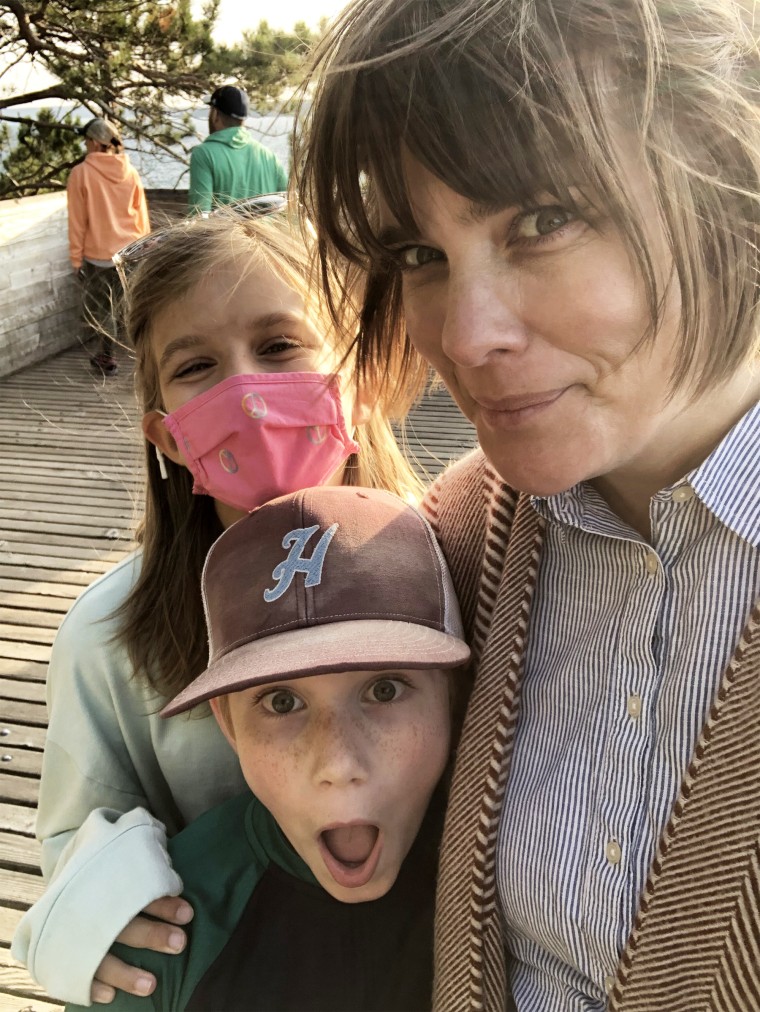Women are even more burned out now than in 2020, with a third of them considering quitting or "downshifting" their careers, according to a new report.
Men say they're burned out too, but the burnout gap widened in 2021, with 42% of women and 35% of men saying they're burned out, up from 32% and 28% in 2020.
Among mothers of young children, half say they often or almost always feel burned out. One in three women has considered downshifting her career or leaving the workforce, up from one in four in 2020, according to the Women in the Workplace survey from Lean In and McKinsey & Company.

"To be completely honest, as parents, we're exhausted," Katherine Pryor, of Whidbey Island, Washington, told TODAY. "Being the parent of young kids is tough enough, but in the midst of a crazy year it's been very demanding."
Pryor downshifted her career early in the pandemic. She had what she calls the luxury of quitting her consulting job to take care of her 4-year-old twins, but now worries about making ends meet and paying for preschool.
Workers across the country are leaving jobs in record numbers, leading some to call this period “The Great Resignation.” Many are seeking higher pay, better hours or safer workplaces. But a year and a half into the pandemic, fatigue and burnout are undeniable.
Kandace Huston has thought about selling her coffee shop, Pacific Grind in Lincoln City, Oregon. She has been struggling to cover shifts and keep her business together while caring for her 4-year-old son.
"The stress with everyday life is a LOT," she told TODAY. "I haven't had a day off since this started, and I'm 3000-plus miles away from all my family."

The Lean In survey found women are five times more likely to be responsible for most or all childcare and housework. More than a third said they spent five hours or more a day on those activities.
"That’s like working another half-time job," Lean In's CEO and co-founder Rachel Thomas told TODAY.
Mothers of young children were also more likely to think being a parent played a role in missing out on a raise or opportunity, or to feel judged when a kid interrupted a Zoom meeting. They worried about requesting time off because they felt they would be judged for caregiving.
That's been true for Melissa Floyd, a mother of two in St. Paul, Minnesota, who lost her job early in the pandemic as her daughter had panic attacks and son cried himself to sleep beside her.
Now in a new job as a consultant, she's the only woman and only person with young children in the office, so she is afraid to miss opportunities and instead has missed "games, performances and untold hugs while sitting on Google Meets or in airports," she said.

She tries to be upbeat at work and home, but has lost hair and sleep from worry.
"I don't sleep trying to figure out how I can afford to keep our house, pay utilities, buy groceries and maintain my kids' quality of life," she said.
The LeanIn.Org and McKinsey & Company report surveyed more than 65,000 employees at 423 companies, and identified other problems for working women.
The report found women face "a broken rung" on the first step to management and were less likely to be promoted. And at a time when diversity, equity and inclusion are getting critical new attention, women are more likely to champion inclusion and allyship — but without compensation or recognition.
At the same time, women managers were more likely to try to balance employees' workloads and provide emotional support to their teams.
"Compared to men at the same level, women leaders are rising to the moment as better people managers and more active champions of diversity, equity, and inclusion," Thomas said. "This should send a very clear message to companies: Not only are mothers still ambitious, they’re the people-focused leaders and DEI champions that companies — and all of us — need right now."
She said companies should start by supporting parents with more paid leave and subsidies for childcare, and embracing flexibility.

"Companies should also make sure employees don’t feel penalized when they take advantage of flexible work options, and there’s evidence some mothers do," she added.
Thomas also thinks strong national policies on paid leave and childcare are an essential next step.
One thing that has helped Pryor, of Whidbey Island, is the child tax credit, which recently allowed her to enroll her twins in daycare so she can restart her career.
Pryor says that without quitting, "I don't know how I would have made it through the last year. I know families did, but I honestly don't know how."
Related:

